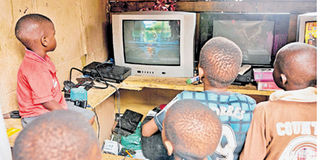Don’t allow video games to destroy our children

What you need to know:
- There are hundreds of video game centres in the city, and they all seem to be doing good business. It means thousands of our children have been sucked into an indulgence that has a potential to spoil their mental, intellectual and physical health.
The concern being raised by parents and child development stakeholders in Dar es Salaam over the effects video games on the young must urgently be acted upon by authorities.
There are hundreds of video game centres in the city, and they all seem to be doing good business. It means thousands of our children have been sucked into an indulgence that has a potential to spoil their mental, intellectual and physical health.
Granted that the world has changed and Tanzanian children cannot be wholly detached from activities associated with computer technology, but the issue is: how much time are our young spending in video games?
The truth is, whether a child plays on a portable unit, a television or the Internet, excessive gaming can affect his or her life. Experts warn that video game addiction can be as problematic as gambling and affects players as young as eight.
Parents are supposed to be fully aware of the effects of a video game compulsion if they are to keep their children’s hobby in check. This advice, however, can only be valid in advanced economies where virtually every home has a computer, an Internet access, or where most parents can afford a portable unit for their child.
The situation is quite different in struggling economies such as Tanzania, where a huge majority of video game fans have to visit a video game establishment, pay a fee and play for a given period of time. In Dar es Salaam, according to our survey, a child pays Sh500 for game that takes 25 minutes.
Absolutely no control
Parents have absolutely no control over the conduct of their children in the video game establishment, some of which, our investigations show, are located very close to schools.
It means owners of such outfits prey on primary school children who can easily raise the Sh500 they need for a single game.
While some studies have shown certain video games can improve hand–eye coordination, problem-solving skills, and the mind’s ability to process information, too much playing may lead to health problems—mostly psychological.
Researches have demonstrated that children who play violent video games are more likely to have increased aggressive thoughts, feelings, and behaviours, and decreased pro-social engagements.
Young people, we all know, need to engage in active play and exercise, since they are crucial for their physical growth. Now it is hard for a child to get enough active play and exercise if he or she is always indoors playing video games.
Experts recommend a maximum of two hours per day before a screen enjoying games or watching TV. As noted above, parents cannot control their children while they are away from home, but we believe teachers can.
A responsible teacher must be able to take note of a pupil who is not in class for long, short of which his or her professional competence will be deemed wanting.
But most importantly, owners of establishments that allow children to engage in video games during school hours must be viewed and placed in the same category of those who sell narcotics to innocent youth.
Authorities must deal with them ruthlessly.




